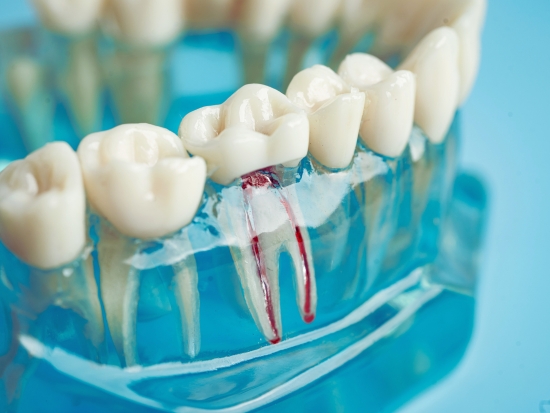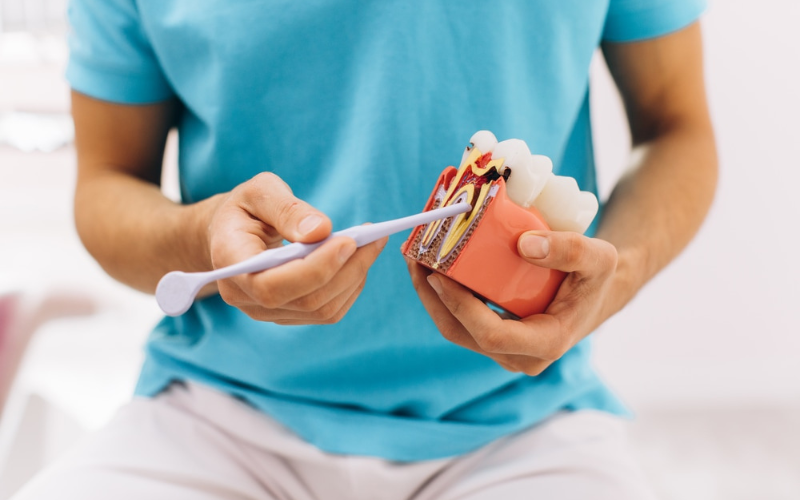What to Expect During a Root Canal

We’ve all heard the offhanded joke before: when discussing something unwanted, the speaker says, “I’d rather get a root canal.”
Root canals have become shorthand for an excruciating and undesirable procedure. Most people imagine sharp instruments and painful treatments, with almost 60% of us listing root canals atop our list of fears over snakes, sharks, and public speaking.
Jokes aside, it’s important to debunk the myth that root canals are something to be afraid of. These common procedures are often painless and fast, and they can relieve the pain of your toothache in no time.
Want to know what to expect before you sit in the dentist’s chair? Let’s take a look at the basics of a root canal procedure to prepare you in advance.
What Is a Root Canal?
Before we dive into the steps of the procedure itself, what is a root canal?
A root canal is a general dentistry treatment that removes the pulp, or the soft inner material, of your teeth. This is often necessary when you are experiencing tooth decay or infection. In some cases, you may also need it if you’ve injured a tooth by chipping or cracking it.
After this removal, your dentist will fill the empty hole within your tooth. You can think of a root canal procedure as a more complex version of an ordinary dental filling for a cavity. You may need more appointments and more filling inserted into your tooth, but the principle is similar.
Root Canal Preparation
As far as expectations go, how should you prepare for your treatment?
You’ll always see your dentist for at least one consultation before your procedure. This gives them a chance to look at your teeth and do any necessary imaging.
At this time, they’ll explain what you should and shouldn’t do right before and after your root canal. They will also discuss your root canal cost, with or without insurance, and decide on the right anesthetic for you.
Though you should follow their specific instructions, here are a few general preparations you should expect to make.
First, you’ll need to avoid alcohol and tobacco for at least 24 hours before your root canal. You can eat before the procedure unless your dentist tells you not to. You should also try to get a full night of sleep, which can help ensure your body is ready to begin its healing effort.
In some cases, your dentist may also tell you to take ibuprofen before the procedure. This anti-inflammatory medicine can help reduce swelling in the affected area.
You’ll also have an opportunity to ask questions. Don’t hesitate, as this can help you feel more comfortable during the procedure.
Root Canal Procedure
The procedure for a root canal is fairly straightforward. The process often happens in only one or two appointments, depending on your condition and needs. For most simple procedures, here’s a quick root canal guide on what to expect:
Steps for Preparation
If your dentist has not already done so, they’ll take X-rays of your tooth, jaw, and gums. This helps them look for any spreading infection in your mouth.
At this time, your dentist will also give you an anesthetic. For most patients, this is a simple local anesthetic, though you can ask for something different if you prefer.
Next, your dentist will place a rubber dam around your tooth. This tool is what you’d expect from the name: a piece of rubber that acts as a dam, keeping the affected tooth dry by preventing saliva from getting into the area. The rubber will cover all of your other teeth and gums during the procedure.
Steps for the Procedure
Your dentist will drill a small opening into the top of your tooth. They will then use specialized tools to remove the damaged, decayed, or infected pulp inside. Their tiny instruments also allow them to scrape and clean the canals at the bottom of your tooth.
When this is done, your dentist will rinse and disinfect the inside of your tooth.
They will then insert a special filling. Unlike the fillings you get for a cavity, this rubbery filling is only temporary.
Weeks later, once your tooth is healed and ready for full protection, your dentist will place a regular filling inside your tooth. They may also place a permanent crown over it.
Sensations to Expect
Again, though root canals have a reputation for being painful, you should expect no pain at any point. Because of the anesthesia, you will feel the sensations of movement in your mouth without experiencing pain.
Most patients feel slight pinching, scratching, or minor pressure during their treatment. If you feel anything more than this, request more anesthetic from your dentist.
Root Canal Recovery
Once the procedure is complete, you can head straight home, to work, or to school. With local anesthetic, most patients can drive by themselves, but be sure to check with your dentist to be sure.
You can eat within 45 minutes of your procedure. However, it’s best to wait for the anesthetic to wear off, as you risk biting your cheek or tongue otherwise. Stick to softer foods that are gentle on your teeth for the rest of the day.
Once the anesthetic has worn off, you might notice slight pain, swelling, or sensitivity. Your dentist may recommend specific OTC pain medications to help with this. If you’re dealing with an infection, you may also need to take oral antibiotics for a set period.
Reach Out With Further Questions
At City Edge Dental, we understand that root canals can feel like an intimidating procedure if you’ve never had one. Our goal is always to offer comfort and healing to our patients, and providing knowledge is sometimes the best way to do so. If you’re still uncertain about getting this procedure, we’d be happy to answer any questions you have to ensure your comfort.
Don’t endure tooth pain and anxiety on your own! A root canal can help address infection and inflammation fast, and you’ll be glad you sat through this simple and painless procedure. Contact us with questions today, or book an appointment to get started.




